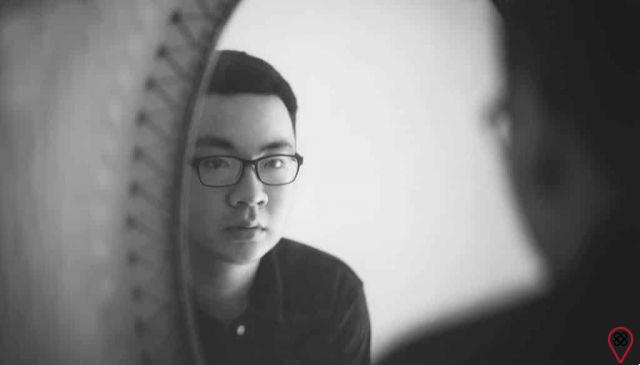Who doesn't want to literally look good in the picture, right? Especially these days, with social networks that we feed with photos of our faces, our bodies and our daily lives.
The problem is that so much exposure ends up causing dissatisfaction with one's own body and face — comparisons are inevitable on the networks… There are many villains when it comes to this topic, but one is being discussed a lot these days: Instagram filters. How do they harm us and our self-esteem?
free plastic?
The truth is that filters that thin the nose and cheeks, increase the size of the lips, the shape of the eyebrows, and so on. They carry out a wish that all generations had: to correct their little “flaws”. If, before, this was only possible through expensive plastic surgeries, today it is done for free in apps.
The problem is that, from using filters so much when posting selfies in Stories and in the Instagram feed, the image we see in the mirror, our real face, leaves us increasingly dissatisfied, because the ideal becomes the unrealistic filtering of social networks.
Little by little, we create in our mind a distorted version of our face and — why not? — of who we are, creating what psychology calls body dysmorphia.
What is body dysmorphia?
Body dysmorphia is a psychological disorder that causes excessive preoccupation with beauty, especially with weight and the face, causing the person to overestimate small imperfections or even common features, strongly impacting their self-esteem.

Body dysmorphia has been around for decades, but it is a consensus among mental health professionals that things have gotten worse in the times we live in, especially because of this comparison between a real-life face versus a face altered by social media filters.
absurd amount
If you think this is a small problem that affects a few people, you are very wrong. A survey by cosmetics brand Dove, published in December 2020, showed that 84% of Spanish teenagers (aged 13 and up) had already used filters or photo editing apps to change their image.
Among these girls, 78% said they tried to change or hide imperfections on their face and body before posting a photo on social media.
Is the other perfect?
This is such a serious problem that even people who don't use filters on their own faces and photos end up suffering from it in the social media world. In the same Dove survey, 35% of teens reported feeling “less pretty” when they see photos of digital influencers and celebrities on social media.

That is, even those who “escape” the filters in their photos suffer because everyone is using them, so the impression is that all women are beautiful, “except me”.
direct impact
Want more proof of how these filters are very bad for people's self-esteem in the long run? This same survey showed that 60% of young women who spend between 10 and 30 minutes editing their photos before posting them said they had low self-esteem.
This percentage drops to only 9% among those who do not edit their photos. It just goes to show that the more time a person spends editing their photos, instead of feeling more beautiful and attractive, they end up feeling the opposite.
a huge industry
Even though we are all “exposed” to this impact on our self-esteem that the virtual world has, women are historically more affected by a problem like this. Historically because the cosmetics and fashion industries have made billions for decades promoting women's dissatisfaction with their own bodies.
To get an idea of how big these industries are, just know that España is the world leader in the ranking of countries with the most young people who have plastic surgery.
In the last 10 years, according to a report published on the website of the USP newspaper, the number of plastic surgeries in young Spanish people grew 140%. In 2016, for example, almost 1,5 million plastic surgeries were performed – and this number does not consider small interventions, such as the so-called facial harmonizations.
Harmonization?
Facial matching is an expression that has become popular in recent years, especially in the news of celebrities and influencers on social networks. When we stop to analyze the very name of this procedure, we have already identified a lot of things that can do harm.

If something needs to be harmonized, it's because it's out of harmony, right? The naturalization of this type of surgery makes us think more and more that our natural characteristics are not harmonic, that harmonic is the pattern of social network models.
But why is it bad for self-esteem?
Do you still have doubts about why social media and app filters are bad for our self-esteem? Check out some points.
Expectation versus reality
Although they try to teach us that we shouldn't have expectations about anything in life, the truth is that it would be impossible to live like this, because we automatically create expectations based on what we see in the world.
When you get too exposed to filters, your expectation is to have a “perfect” face like that, which can be frustrating.
Disharmony
As I said before, the idea that our natural nature – the characteristics we were born with – is slowly taking root in us, so it would be necessary to harmonize.

This is cruel because it makes us less and less accepting of who we are and also because we become slaves to the fashion of the moment. And when the face shape of current fashion is different? Does everyone come back to the operating table?
Too much time on the networks
A survey published by Stanford University, in the United States, in 2018, showed an alarming data. Among the 62 young women interviewed for the study, XNUMX% said that their moments of lowest self-esteem are those when they spend more time on social media.
You may also like
- 5 Social Media Habits That Can Depress You
- Meet the story of someone who walked away from social media
- How does social media create young narcissists?
And how to fight it?
There is not much to run to: the business is to accept yourself! Of course, if you have a physical problem that brings embarrassment and discomfort to your routine, it may be good to seek cosmetic surgery.
But, for those who don't go through this, accepting reality as it is and its own beauty as it exists in the world is essential to find a place of peace and tranquility amidst the many stimuli brought by social networks.
Now that you have an idea of the size of the impact that social media filters can have on our lives, how about being more careful with them so you don't end up worrying more than you should about those characteristics that make you unique?

























